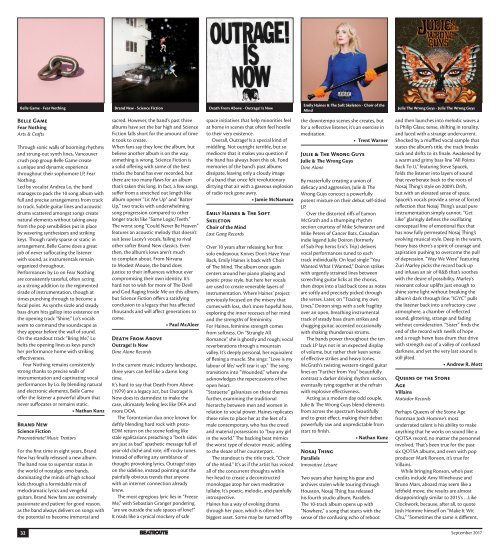Beatroute Magazine BC Print Edition - September 2017
BeatRoute Magazine is a monthly arts and entertainment paper with a predominant focus on music – local, independent or otherwise. The paper started in June 2004 and continues to provide a healthy dose of perversity while exercising rock ‘n’ roll ethics. Currently BeatRoute’s AB edition is distributed in Calgary, Edmonton (by S*A*R*G*E), Banff and Canmore. The BC edition is distributed in Vancouver, Victoria and Nanaimo. BeatRoute (AB) Mission PO 23045 Calgary, AB T2S 3A8 E. editor@beatroute.ca BeatRoute (BC) #202 – 2405 E Hastings Vancouver, BC V5K 1Y8 P. 778-888-1120
BeatRoute Magazine is a monthly arts and entertainment paper with a predominant focus on music – local, independent or otherwise. The paper started in June 2004 and continues to provide a healthy dose of perversity while exercising rock ‘n’ roll ethics.
Currently BeatRoute’s AB edition is distributed in Calgary, Edmonton (by S*A*R*G*E), Banff and Canmore. The BC edition is distributed in Vancouver, Victoria and Nanaimo. BeatRoute (AB) Mission PO 23045 Calgary, AB T2S 3A8 E. editor@beatroute.ca BeatRoute (BC) #202 – 2405 E Hastings Vancouver, BC V5K 1Y8 P. 778-888-1120
You also want an ePaper? Increase the reach of your titles
YUMPU automatically turns print PDFs into web optimized ePapers that Google loves.
Belle Game - Fear Nothing Brand New - Science Fiction Death From Above - Outrage! Is Now<br />
Belle Game<br />
Fear Nothing<br />
Arts & Crafts<br />
Through sonic walls of booming rhythms<br />
and strung-out synth lines, Vancouver<br />
crush pop group Belle Game create<br />
a unique and dynamic experience<br />
throughout their sophomore LP, Fear<br />
Nothing.<br />
Led by vocalist Andrea Lo, the band<br />
manages to pack the 10 song album with<br />
full and precise arrangements from track<br />
to track. Subtle guitar lines and acoustic<br />
drums scattered amongst songs create<br />
natural elements without taking away<br />
from the pop sensibilities put in place<br />
by wavering synthesizers and striking<br />
keys. Though rarely sparse or static in<br />
arrangement, Belle Game does a great<br />
job of never suffocating the listener<br />
with sound, as instrumentals remain<br />
organized throughout.<br />
Performances by Lo on Fear Nothing<br />
are consistently tasteful, often acting<br />
as a strong addition to the regimented<br />
tirade of instrumentation, though at<br />
times punching through to become a<br />
focal point. As synths sizzle and steady<br />
bass drum hits gallop into existence on<br />
the opening track “Shine,” Lo’s vocals<br />
seem to command the soundscape as<br />
they appear before the wall of sound.<br />
On the standout track “Bring Me,” Lo<br />
belts the opening lines as keys punch<br />
her performance home with striking<br />
effectiveness.<br />
Fear Nothing remains consistently<br />
strong thanks to precise walls of<br />
instrumentation and captivating vocal<br />
performances by Lo. By blending natural<br />
and electronic elements, Belle Game<br />
offer the listener a powerful album that<br />
never suffocates or remains static.<br />
• Nathan Kunz<br />
Brand New<br />
Science Fiction<br />
Procrastinate! Music Traitors<br />
For the first time in eight years, Brand<br />
New has finally released a new album.<br />
The band rose to superstar status in<br />
the world of nostalgic emo bands,<br />
dominating the minds of high school<br />
kids through a formidable mix of<br />
melodramatic lyrics and vengeful<br />
guitars. Brand New fans are extremely<br />
passionate and patient for good reason,<br />
as the band always delivers on songs with<br />
the potential to become immortal and<br />
sacred. However, the band’s past three<br />
albums have set the bar high and Science<br />
Fiction falls short for the amount of time<br />
it took to create.<br />
When fans say they love the album, but<br />
believe another album is on the way,<br />
something is wrong. Science Fiction is<br />
a solid offering with some of the best<br />
tracks the band has ever recorded, but<br />
there are too many flaws for an album<br />
that’s taken this long. In fact, a few songs<br />
suffer from a stretched out length like<br />
album opener “Lit Me Up“ and “Batter<br />
Up,” two tracks with underwhelming<br />
song progression compared to other<br />
longer tracks like “Same Logic/Teeth.”<br />
The worst song “Could Never Be Heaven”<br />
features an acoustic melody that doesn’t<br />
suit Jesse Lacey’s vocals, failing to rival<br />
other softer Brand New classics. Even<br />
then, the album’s lows aren’t much<br />
to complain about. From Nirvana<br />
to Modest Mouse, the band does<br />
justice to their influences without ever<br />
compromising their own identity. It’s<br />
hard not to wish for more of The Devil<br />
and God Raging Inside Me on this album,<br />
but Science Fiction offers a satisfying<br />
conclusion to a legacy that has affected<br />
thousands and will affect generations to<br />
come.<br />
• Paul McAleer<br />
Death From Above<br />
Outrage! Is Now<br />
Dine Alone Records<br />
In the current music industry landscape,<br />
three years can feel like a damn long<br />
time.<br />
It’s hard to say that Death From Above<br />
(1979) are a legacy act, but Outrage! Is<br />
Now does its damndest to make the<br />
case, ultimately feeling less like DFA and<br />
more DOA.<br />
The Torontonian duo once known for<br />
deftly blending hard rock with proto-<br />
EDM return on the scene feeling like<br />
stale egalitarians preaching a “both sides<br />
are just as bad” apathetic message full of<br />
year-old cliché and rote, riff-rocky tunes.<br />
Instead of offering any semblance of<br />
thought-provoking lyrics, Outrage! stays<br />
on the sideline, instead pointing out the<br />
painfully obvious trends that anyone<br />
with an internet connection already<br />
knew.<br />
The most egregious lyric lies in “Freeze<br />
Me,” with Sebastian Granger pondering<br />
“are we outside the safe spaces of love?”<br />
It reads like a cynical mockery of safe<br />
space initiatives that help minorities feel<br />
at home in scenes that often feel hostile<br />
to their very existence.<br />
Overall, Outrage! Is a special kind of<br />
middling. Not outright terrible, but so<br />
mediocre that it makes you question if<br />
the band has always been this ok. Fond<br />
memories of the band’s past albums<br />
dissipate, leaving only a cloudy image<br />
of a band that once felt revolutionary<br />
dirtying that air with a gaseous explosion<br />
of radio rock gone awry.<br />
• Jamie McNamara<br />
Emily Haines & The Soft<br />
Skeleton<br />
Choir of the Mind<br />
Last Gang Records<br />
Over 10 years after releasing her first<br />
solo endeavour, Knives Don’t Have Your<br />
Back, Emily Haines is back with Choir<br />
of The Mind. The album once again<br />
centers around her piano playing and<br />
poetic prose style, but here her vocals<br />
are used to create venerable layers of<br />
instrumentation. Where Haines’ project<br />
previously focused on the misery that<br />
comes with loss, she’s more hopeful here,<br />
exploring the inner recesses of her mind<br />
and the strengths of femininity.<br />
For Haines, feminine strength comes<br />
from softness. On “Strangle All<br />
Romance” she is ghostly and rough; vocal<br />
reverberations through a mountain<br />
valley. It’s deeply personal, her equivalent<br />
of flexing a muscle. She sings: “Love is my<br />
labour of life/ we’ll tear it up.” The song<br />
transitions into “Wounded,” where she<br />
acknowledges the repercussions of her<br />
open heart.<br />
“Statuette” galvanizes on these themes<br />
further, examining the traditional<br />
hierarchy between men and women in<br />
relation to social power. Haines replicates<br />
these roles to place her at the feet of a<br />
male contemporary, who has the creed<br />
and material possessions to “buy any girl<br />
in the world.” The backing beat mimics<br />
the worst type of elevator music, adding<br />
to the sleaze of her counterpart.<br />
The standout is the title track, “Choir<br />
of the Mind.” It’s as if the artist has voiced<br />
all of the concurrent thoughts within<br />
her head to create a deconstructed<br />
monologue atop her own meditative<br />
lullaby. It’s poetic, melodic, and painfully<br />
introspective.<br />
Haines has a way of evoking drama<br />
through her pace, which is often her<br />
biggest asset. Some may be turned off by<br />
Emily Haines & The Soft Skeleton - Choir of the<br />
Mind<br />
the downtempo scenes she creates, but<br />
for a reflective listener, it’s an exercise in<br />
meditation.<br />
• Trent Warner<br />
Julie & The Wrong Guys<br />
Julie & The Wrong Guys<br />
Dine Alone<br />
By masterfully creating a union of<br />
delicacy and aggression, Julie & The<br />
Wrong Guys concoct a powerfully<br />
potent mixture on their debut self-titled<br />
LP.<br />
Over the distorted riffs of Eamon<br />
McGrath and a thumping rhythm<br />
section courtesy of Mike Schwarzer and<br />
Mike Peters of Cancer Bats, Canadian<br />
indie legend Julie Doiron (formerly<br />
of Sub Pop heros Eric’s Trip) delivers<br />
vocal performances tuned to each<br />
track individually. On lead single “You<br />
Wanted What I Wanted,” Doiron strikes<br />
with urgently strained lines between<br />
screeching guitar licks at the chorus,<br />
then drops into a laid back tone as notes<br />
are softly and precisely picked through<br />
the verses. Later, on “Tracing my own<br />
Lines,” Doiron sings with a soft fragility<br />
over an open, breathing instrumental<br />
track of steady bass drum strikes and<br />
chugging guitar, accented occasionally<br />
with shaking thunderous strums.<br />
The bands power throughout the ten<br />
track LP lays not in an expected display<br />
of volume, but rather their keen sense<br />
of effective strikes and heavy tones.<br />
McGrath’s twisting western-tinged guitar<br />
lines on “Farther from You” beautifully<br />
contrast a darker driving rhythm section,<br />
eventually tying together at the refrain<br />
with explosive effectiveness.<br />
Acting as a modern day odd couple,<br />
Julie & The Wrong Guys blend elements<br />
from across the spectrum beautifully<br />
and to great effect, making their debut<br />
powerfully raw and unpredictable from<br />
start to finish.<br />
• Nathan Kunz<br />
Nosaj Thing<br />
Parallels<br />
Innovative Leisure<br />
Two years after having his gear and<br />
archives stolen while touring through<br />
Houston, Nosaj Thing has released<br />
his fourth studio album, Parallels.<br />
The 10-track album opens up with<br />
“Nowhere,” a song that starts with the<br />
sense of the confusing echo of reboot<br />
Julie The Wrong Guys - Julie The Wrong Guys<br />
and then launches into melodic waves a<br />
la Philip Glass; tense, shifting in tonality,<br />
and laced with a strange undercurrent.<br />
Shocked by a muffled vocal sample that<br />
states the album’s title, the track breaks<br />
tack and drifts to its finale. Awakened by<br />
a warm and grimy bass line “All Points<br />
Back To U,” featuring Steve Spacek,<br />
folds the listener into layers of sound<br />
that reverberate back to the roots of<br />
Nosaj Thing’s style on 2009’s Drift,<br />
but with an elevated sense of space.<br />
Spacek’s vocals provide a sense of forced<br />
reflection that Nosaj Thing’s usual pure<br />
instrumentation simply cannot. “Get<br />
Like” glaringly defines the oscillating<br />
conceptual line of emotional flux that<br />
has now fully permeated Nosaj Thing’s<br />
evolving musical style. Deep in the warm,<br />
heavy bass there’s a spirit of courage and<br />
aspiration pushing to overcome the pull<br />
of depression. “Way We Were” featuring<br />
Zuri Marley picks the record back up<br />
and infuses an air of R&B that’s soothes<br />
with the desire of possibility. Marley’s<br />
resonant colour uplifts just enough to<br />
shine some light without breaking the<br />
album’s dark through line. “IGYC” pulls<br />
the listener back into a refractory cave<br />
atmosphere, a chamber of reflected<br />
sound, glittering, strange and fading<br />
without consideration. “Sister” finds the<br />
end of the record with swells of hope<br />
and a rough hewn bass drum that drive<br />
with strength out of a valley of confused<br />
darkness, and yet the very last sound is<br />
still jilted.<br />
• Andrew R. Mott<br />
Queens of the Stone<br />
Age<br />
Villains<br />
Matador Records<br />
Perhaps Queens of the Stone Age<br />
frontman Josh Homme’s most<br />
underrated talent is his ability to make<br />
anything that he works on sound like a<br />
QOTSA record, no matter the personnel<br />
involved. That’s been true for the past<br />
six QOTSA albums, and even with pop<br />
producer Mark Ronson, it’s true for<br />
Villains.<br />
While bringing Ronson, who’s past<br />
credits include Amy Winehouse and<br />
Bruno Mars, aboard may seem like a<br />
leftfield move, the results are almost<br />
disappointingly similar to 2015’s …Like<br />
Clockwork, because, after all, to quote<br />
Josh Homme himself on “Make It Wit<br />
Chu,” “Sometimes the same is different,<br />
32<br />
<strong>September</strong> <strong>2017</strong>


















